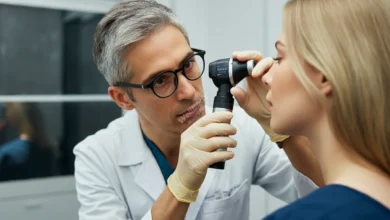5 Yearly Health Screenings You Shouldn’t Skip

Introduction
Did you know that regular health check-ups could save your life? It’s true! Preventive health screenings are like giving your body an annual tune-up. They can catch potential issues before they become serious problems.
Imagine finding a small leak in your roof before it turns into a flood in your living room. That’s what these screenings do for your health! They help doctors spot early signs of diseases when they’re easiest to treat.
In this post, we’ll explore five essential medical tests you should get every year. These screenings are your best bet for staying healthy and catching any issues early. Let’s dive in!
1. Annual Physical Exam: Your Yearly Health Check-In

Think of your annual physical as a yearly report card for your body. It’s a chance for your doctor to give you a thorough once-over and make sure everything’s running smoothly.
What’s Included in an Annual Physical?
During your annual physical, your doctor will typically:
- Check your blood pressure
- Measure your weight and calculate your BMI (Body Mass Index)
- Listen to your heart and lungs
- Examine your skin for any concerning changes
- Ask about your lifestyle habits and any health concerns
This exam helps establish a baseline for your overall health. It’s like taking a snapshot of your health each year. This way, your doctor can spot any changes that might need attention.
How often should you get an annual physical? As the name suggests, aim for once a year. It’s a small time investment that can pay big dividends for your health!
2. Blood Tests: A Window into Your Health
Blood tests are like peeking under the hood of your body’s engine. They can reveal a lot about your health that isn’t visible from the outside.
Key Blood Tests to Know About
Here are some important blood tests your doctor might recommend:
- Complete Blood Count (CBC): This test checks for anemia, infections, and other blood disorders.
- Lipid Panel: Also known as a cholesterol test, this screens for heart disease risk.
- Blood Glucose: This test checks for diabetes or pre-diabetes.
- Thyroid Function: These tests look at how well your thyroid gland is working.
Each of these tests provides valuable information about different aspects of your health. For example, the lipid panel can help predict your risk of heart disease, while the blood glucose test can catch diabetes early.
How often should you get blood tests? The frequency depends on your age, health status, and risk factors. Generally, healthy adults should get these tests at least once a year. However, your doctor might recommend more frequent testing if you have specific health concerns.
Remember, these blood tests are powerful tools for early detection and prevention. They can catch potential issues before you even feel any symptoms!
3. Cancer Screenings: Catching the Silent Killer Early

Cancer is often called a silent killer because it can develop without obvious symptoms. That’s why regular cancer screenings are so crucial. They can detect cancer in its early stages when it’s most treatable.
Recommended Cancer Screenings by Gender and Age
Different types of cancer screenings are recommended based on your gender and age. Here’s a quick breakdown:
| Gender | Age | Recommended Screenings | Frequency |
|---|---|---|---|
| Women | 40+ | Mammogram | Every 1-2 years |
| Women | 21-65 | Pap smear | Every 3 years |
| Men | 50+ | Prostate exam | Discuss with doctor |
| Both | 45+ | Colorectal cancer screening | Every 10 years for colonoscopy |
Women’s screenings: Mammograms can detect breast cancer early, while Pap smears check for cervical cancer. These tests have saved countless lives through early detection.
Men’s screenings: Prostate exams, including the PSA blood test, can help detect prostate cancer. However, the benefits and risks should be discussed with your doctor.
Screenings for everyone: Colorectal cancer screening, often done through colonoscopy, is recommended for both men and women starting at age 45.
Remember, these are general guidelines. Your doctor might recommend different schedules based on your personal risk factors and family history.
4. Skin Check: Your Body’s Largest Organ Needs Attention Too

Your skin is your body’s largest organ, and it’s constantly exposed to the elements. With skin cancer rates on the rise, regular skin checks are more important than ever.
What Does a Professional Skin Check Involve?
During a professional skin check, a dermatologist will:
- Examine your skin from head to toe
- Look for any suspicious moles or growths
- Use special tools to get a closer look at concerning areas
- Discuss any changes you’ve noticed in your skin
How often should you get a professional skin check? Most people should aim for an annual check. However, if you have a history of skin cancer or are at high risk, your doctor might recommend more frequent checks.
Self-Examination Tips
Between professional checks, it’s important to keep an eye on your own skin. Here are some tips for self-examination:
- Check your skin monthly
- Look for the ABCDE signs of melanoma:
- Asymmetry
- Border irregularity
- Color changes
- Diameter larger than 6mm
- Evolving size, shape, or color
- Use a mirror to check hard-to-see areas
- Ask a partner to help check your back and scalp
Remember, early detection is key when it comes to skin cancer. If you notice any concerning changes in your skin, don’t hesitate to contact your doctor.
5. Dental Check-up and Cleaning: More Than Just a Bright Smile

Your oral health is closely linked to your overall health. Regular dental check-ups and cleanings aren’t just about maintaining a beautiful smile – they’re essential for your general well-being.
What Happens During a Dental Check-up?
A typical dental check-up includes:
- Visual examination of your teeth, gums, and mouth
- X-rays to detect hidden issues like cavities or bone loss
- Oral cancer screening
- Professional cleaning to remove plaque and tartar
Why Are Dental Check-ups So Important?
Regular dental visits can:
- Prevent gum disease, which has been linked to heart disease and diabetes
- Detect oral cancer early
- Identify cavities before they become painful or require extensive treatment
- Maintain overall health, as many systemic diseases have oral symptoms
How often should you visit the dentist? Most people should aim for twice-yearly check-ups and cleanings. However, your dentist might recommend more frequent visits if you have specific oral health concerns.
Remember, a healthy mouth contributes to a healthy body. Don’t neglect this crucial aspect of your health!
Conclusion: Your Health is in Your Hands

We’ve covered five essential yearly health screenings that can make a significant difference in your overall well-being:
- Annual Physical Exam
- Blood Tests
- Cancer Screenings
- Skin Check
- Dental Check-up and Cleaning
Each of these screenings plays a vital role in maintaining your health and catching potential issues early. By staying on top of these check-ups, you’re taking a proactive approach to your health.
Prevention is always better than cure. These screenings give you the power to address health concerns before they become serious problems. They’re your best defense against many common health issues.
Call to Action: Take Charge of Your Health Today!
Now that you know about these important health screenings, it’s time to take action:
- Schedule your screenings: Contact your healthcare provider to set up appointments for any overdue screenings.
- Create a health calendar: Mark your yearly screenings on a calendar to ensure you don’t miss them.
- Talk to your doctor: Discuss which screenings are right for you based on your age, gender, and personal risk factors.
- Spread the word: Share this information with friends and family. You could be helping someone catch a health issue early!
Remember, your health is your most valuable asset. By prioritizing these yearly health screenings, you’re investing in a healthier, happier future.
Don’t wait – take the first step towards better health today!



